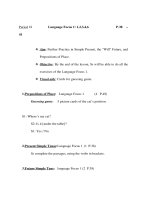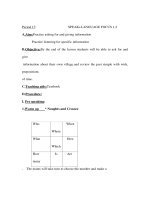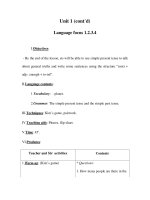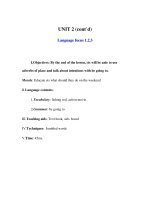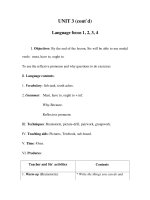In focus 1 sb
Bạn đang xem bản rút gọn của tài liệu. Xem và tải ngay bản đầy đủ của tài liệu tại đây (17.25 MB, 119 trang )
www.frenglish.ru
www.frenglish.ru
www.frenglish.ru
1
Student’s Book
Charles Browne • Brent Culligan • Joseph Phillips
www.frenglish.ru
79 Anson Road, #06-04/06, Singapore 079906
Cambridge University Press is part of the University of Cambridge.
It furthers the University’s mission by disseminating knowledge in the pursuit of
education, learning and research at the highest international levels of excellence.
www.cambridge.org
Information on this title: www.cambridge.org/9781107627093
© Cambridge University Press 2014
This publication is in copyright. Subject to statutory exception
and to the provisions of relevant collective licensing agreements,
no reproduction of any part may take place without the written
permission of Cambridge University Press.
First published 2014
Printed in Singapore by Markono Print Media Pte Ltd
ISBN
ISBN
978-1-107-62709-3 paperback Student’s Book 1
978-1-107-67182-9 paperback Teacher’s Manual 1
Additional resources for this publication at www.cambridge.org/infocus
Cambridge University Press has no responsibility for the persistence or accuracy of
URLs for external or third-party internet websites referred to in this publication,
and does not guarantee that any content on such websites is, or will remain,
accurate or appropriate. Information regarding prices, travel timetables, and other
factual information given in this work is correct at the time of first printing but
Cambridge University Press does not guarantee the accuracy of such information
thereafter.
www.frenglish.ru
Contents
Plan of the book
Acknowledgments
iv
viii
To the teacher
ix
How a unit works
x
To the student
xii
UNIT 1
1
UNIT 2
9
UNIT 3
17
UNIT 4
25
UNIT 5
33
UNIT 6
41
UNIT 7
49
UNIT 8
57
UNIT 9
65
UNIT 10
73
UNIT 11
81
UNIT 12
89
Activities
97
Core vocabulary: keywords
Unit-by-unit list
103
Alphabetical list
104
Credits
105
iii
www.frenglish.ru
Plan of the book
Cycle 1
Unit
1
Title/Topic
Reading texts
Reading skills
Vocabulary
The Effects of
Advertising
1 Advertising &
Consumerism
Scanning
Skimming
Identifying a part of
speech: verbs
2 You Are What You Buy
Identifying topic and
main idea
Word parts: ism
Example: consumerism
Benefits and
disadvantages of
advertising
Identifying unnecessary
information
Cycle 1
Pages 1–8
2
Identifying opinions
Extreme
Sports
1 Extreme Athletes
Scanning
2 Extreme Sports,
Extreme Risks
Skimming
Why do extreme
sports? What are the
risks?
Identifying opinions
Cycle 1
Our Aging
Population
1 Time to Relax?
Scanning
2 Growing Old
Skimming
Identifying topic and
main idea
Problems of
increasing numbers of
old people
Finding supporting ideas
Cycle 1
Robots in the
Home
Word parts: medi
Example:
Mediterranean
1 Living with Robots
Scanning
2 A New Member of the
Family
Skimming
Identifying a part of
speech: nouns
Identifying topic and
main idea
Word parts: uni
Example: universal
Benefits of personal
robots
Identifying unnecessary
information
Identifying opinions
Pages 25–32
Cycle 1
Identifying a part of
speech: adjectives and
nouns
Making inferences
Pages 17–24
4
Word parts: para
Example: parachute
Logical reasoning
Pages 9–16
3
Identifying topic and
main idea
Identifying a part of
speech: verbs and
adverbs
5
Animals: Our
Research
Partners?
1 Animal Testing
Scanning
2 Is Animal Research
Necessary?
Skimming
Word friends
(collocations)
Identifying topic and
main idea
Word parts: dis
Example: disease
Benefits and the
cruelty of animal
testing
Logical reasoning
Identifying opinions
Cycle 1
Pages 33–40
6
Pages 41–48
iv
The Online
Information
Debate
Benefits and
disadvantages of
digital information
1 The Death of the
Encyclopedia
Scanning
Skimming
Word friends
(collocations)
2 The Age of Digital
Information
Identifying topic and
main idea
Word parts: sur
Example: survey
Finding supporting ideas
Identifying opinions
www.frenglish.ru
Critical thinking
Research skills
Writing
Skills
Speaking
Information gathering
Sentence writing
Matching statements with
the author’s opinion
•
•
Analyzing advertisements
Comparing results
•
Comparing and discussing
advertisements and their
effectiveness
The most popular and
effective advertising
techniques
Categorizing the effects
of advertising: positive or
negative
Discussion
•
Quotable Quotes
•
Information gathering
Sentence writing
•
Taking up a sport again after
a serious accident
Ranking how dangerous
certain sports are
Comparing results
•
Comparing and discussing
popularity of sports
Information gathering
•
Comparing the average age
of populations in different
countries
•
Discussion
Finding out and ranking the
reasons for people to do
sports
Quotable Quotes
•
Sentence writing
What old people fear most
about growing old
Matching statements with
the author’s opinion
Ranking fears about old age
•
Sentence writing
•
Should robots have rights?
Matching statements with
the author’s opinion
•
Ranking household activities
that robots could do
•
•
Sentence writing
Reacting to opinions on the
use of animals in research
Matching statements with
the author’s opinion
Ranking which animals
should have most rights
Comparing results
•
Discussing the use of
animals to find cures for
diseases
Information gathering
•
Questionnaire on Internet
media usage by students
Comparing results
•
Comparing and discussing
popularity and legality of
media usage
Discussing the best age to be
rich and poor
Designing a new robot in a
small group
Presenting the robot to the
class
Quotable Quotes
Discussing different
functions of robots and
which types will exist in the
future
Completing an information
chart on animals and medical
research
Considering questions about
society and the elderly
Discussion
•
Comparing results
Information gathering
Discussing people who “live
dangerously”
Quotable Quotes
Information gathering
•
Should extreme athletes
have to pay their own
hospital bills?
Discussion
•
Comparing ideas for coping
with different population
ages
Completing an information
chart on movies starring
robots
Discussing whether
advertising must always tell
the truth
Matching statements with
the author’s opinion
Comparing results
•
Matching slogans with
advertising techniques
”Greenwashing” as an
advertising technique
Discussing whether data on
computers is safe
Discussion
•
•
Assessing different
arguments for and against
animal rights
Deciding as a class who wins
the vote
Quotable Quotes
•
Sentence writing
Pros and cons of research on
the Internet
Matching statements with
the author’s opinion
Ranking different news
sources
Discussing whether
cosmetics could be tested on
prisoners
Discussion
•
•
The right to use information
available on the Internet
Reporting results of
discussions
Quotable Quotes
•
Discussing the Internet and
free speech
v
www.frenglish.ru
Plan of the book
Cycle 2
Unit
7
Cycle 2
Pages 49–56
8
Title/Topic
Reading texts
Reading skills
Vocabulary
Online
Advertising:
Making Our
Lives Better?
1 Advertising
Techniques
Scanning
Skimming
Word friends
(collocations)
2 How Advertisers Use
the Internet
Identifying topic and
main idea
Word parts: con/com
Example: company
Identifying unnecessary
information
How advertising
works
Winning at
Any Cost
Identifying opinions
1 How to Do Better
Scanning
2 Drugs in Sport
Skimming
Word friends
(collocations)
Identifying topic and
main idea
Word parts: gni/gnos
Example: recognize
Competition, drugs,
and sport
Logical reasoning
Identifying opinions
Cycle 2
Pages 57–64
9
Cycle 2
Pages 65–72
10
Do You
Want to Live
Forever?
1 Living Longer
Scanning
Words in context
2 Can We Afford to Live
Longer?
Skimming
Word parts: im
Example: immortal
Science extending
human life in the
future
I Lost my Job
to a Machine!
Finding supporting ideas
Identifying opinions
1 Technology and
Society
Scanning
Words in context
Skimming
2 The New Luddites
Identifying topic and
main idea
Word parts: auto
Example: automobile
Future effects of
technology and robots
on employment
Identifying unnecessary
information
Identifying opinions
Cycle 2
Pages 73–80
11
Identifying topic and
main idea
Treatment of
Animals
Do animals have
rights?
1 Standing Up for
Animals
Scanning
Words in context
Skimming
2 People for Animal
Rights
Identifying topic and
main idea
Word parts: sub
Example: subzero
Logical reasoning
Identifying opinions
Cycle 2
Pages 81–88
12
News sources and
how reliable they are
1 The News Industry
Today
Scanning
Words in context
Skimming
2 Can We Trust the
News?
Identifying topic and
main idea
Word parts: inter
Example: Internet
Finding supporting ideas
Identifying opinions
Pages 89–96
vi
Who Owns
the News?
www.frenglish.ru
Critical thinking
Research skills
Writing
Skills
Information gathering
Sentence writing
Matching statements with
the author’s opinion
•
Matching advertisements
with advertising technique
Pros and cons of advertising
Ranking personal
information that students
are willing to provide online
Comparing results
•
Comparing and discussing
advertising techniques and
their popularity
Information gathering
•
Collecting information on
real cases of competition
Comparing results
•
•
Ranking time spent on
everyday activities in the UK
•
Sentence writing
Should dangerous or risky
activities be a question of
personal choice?
Sentence writing
Issues and disadvantages of
living very long lives
•
Brainstorming areas where
robots can replace humans
Pros and cons of technology
and society
Comparing results
•
Ranking activities in which
drugs are likely to be used
Quotable Quotes
Matching statements with
the author’s opinion
Ranking lifestyles that lead
to a long life
Matching statements with
the author’s opinion
Sentence writing
Should protesters be
allowed to stop a circus
performance?
Discussion
•
Sentence writing
Very unusual news stories
Discussing the role of the
teacher and technology in
the classroom
Discussion
Ranking animals from most
liked to least liked
Quotable Quotes
•
•
Finding out which news
stories are most popular
Discussing probable,
possible, and impossible
technological inventions
•
Comparing and discussing
the results
Information gathering
•
Discussing the meaning of
“quality of life”
Matching statements with
the author’s opinion
Comparing results
Comparing results
Planning life after retirement
Presenting plans to the class
Quotable Quotes
•
•
Matching headlines to
category of news story
Discussing how important
winning is
Quotable Quotes
Information gathering
•
Where and how people
compete in life
Discussion
•
•
Ranking likelihood of jobs
for robots in the future
Discussing jobs that robots
should not do
Collecting information on
food production in different
countries
Discussion
•
Sentence writing
Discussing the power of
advertising to influence
people
•
Comparing and discussing
the results with those of
students
Information gathering
Designing an online ad
Presenting the ad to the class
and agreeing which is most
effective
Matching statements with
the author’s opinion
•
Comparing results
•
Discussion
•
•
Quotable Quotes
Comparing and discussing
other cases of real world
competition
Information gathering
Speaking
Matching statements with
the author’s opinion
Ranking how probable
different news stories are
Discussing different opinions
on the treatment of animals
Discussing quotes for and
against killing animals
Discussion
•
•
Discussing the differences
between traditional reporting
and citizen journalism
Reporting ideas to the class
Quotable Quotes
•
Discussing if the media can
control the way people think
vii
www.frenglish.ru
Acknowledgments
Charles Browne would like to thank his wife, Yukari, and their three children, Joshua, Noah,
and Hannah. Joseph Phillips would like to acknowledge the support of his wife, Miho Tajima,
and their children, who tried to do their best to behave while he was working on In Focus.
Brent Culligan would like to thank his family, who provided most of the motivation to continue
this project, especially when the true extent of the commitment became apparent.
The authors thank Richard Walker for his tireless, patient, and positive support throughout
the entire writing process, and Katherine Wong for her unwavering professionalism and help
during the various stages of the project.
Many people contributed to the development of In Focus. The authors and publisher would like
to particularly thank the following reviewers for their valuable insights:
Glenn Allies, International Graduate School of English, Seoul, South Korea; Shawn Beasom,
Chuo University, Tokyo, Japan; Mark Christianson, International Christian University, Tokyo,
Japan; Andrew Cook, Busan University, Busan, South Korea; Tony Covello, Yeojoo Institute of
Technology, Yeoju, South Korea; Jay Fraser, Soongsil University, Seoul, South Korea; Johnny
Gou, National Taiwan University of Education, Taipei, Taiwan; Jason M. Ham, The Catholic
University of South Korea, Seoul, South Korea; Shu-fen Huang, National Central University,
Zhongli, Taiwan; Mitsuko Izutsu, Sapporo Gakuin University, Sapporo, Japan; Steven Kirk,
University of Tokyo, Tokyo, Japan; Yayoi Kosugi, Keio University, Tokyo, Japan; J. Lake,
Fukuoka Women’s University, Fukuoka, Japan; Tae Lee, Yonsei University, Seoul, South Korea;
Chi-fan Lin, Shih Hsin University, Taipei, Taiwan; Michael McCollister, Feng Chia University,
Taichung, Taiwan; Philip Moriarty, Chinese Culture University, Taipei, Taiwan; Kazuhiro Nomura,
Kobe City University of Foreign Studies, Kobe, Japan; Sakae Onoda, Kanda University of
International Studies, Chiba, Japan; Shuji Ozeki, Nagoya University, Nagoya, Japan; Peeriya
Pongsarigun, Chulalongkorn University, Bangkok, Thailand; Woralap Sangvatanachai, Khon
Kaen University, Khon Kaen, Thailand; Chris Shanks, British Council, Bangkok, Thailand; David
Travis Shaw, Chung-Ang University, Seoul, South Korea; Richmond Stroupe, Soka University,
Tokyo, Japan; Mingjen Tsai, National Pingtung University of Science and Technology, Neipu,
Taiwan; Modesto Tumacder, Dongguk University, Seoul, South Korea; Yoko Wakui, Aoyama
Gakuin University, Tokyo, Japan; Douglas Wood, British Council, Bangkok, Thailand; Jennilee
Yoon, Gachon University, Seongnam, South Korea
The authors thank Chris Caridia and Cambridge University Press staff:
Harry Ahn, Karen Brock, Seil Choi, Leo Chon, Sean Elwell-Sutton, Tomomi Katsuki, Alice Kim,
Nesha Naidu, Jinhee Park, Panthipa Rojanasuworapong, Mario Santos, Satoko Shimoyama,
Ivan Sorrentino, Stuart Vinnie, Irene Yang
Book and cover design by Designers Collective
Book layout by Transnet Pte Ltd
Illustrations by LiDan Illustration & Design Studio
Audio production by Anzak Modern Music Productions
viii
www.frenglish.ru
To the teacher
Welcome to In Focus, a three-level, corpus-informed course aimed at university
and college students. In Focus is designed to build vocabulary, reading, discussion,
presentation, and critical thinking skills. Each Student’s Book contains 12 topic-based
units, which are divided into two cycles of six general themes. Units follow a light
gradation of difficulty, which allows you to vary the order in which you teach them
according to your students’ interests and time. In Focus is supplemented by a range
of free, dedicated online components, which provide great flexibility and help to
speed language acquisition.
Using the multi-billion-word Cambridge English Corpus, we have created a unique
lexical syllabus containing the most important words for second language learners of
English. This syllabus comprises two word lists: a New General Service List (NGSL),
a list of approximately 2,800 words; and a New Academic Word List (NAWL), a list of
approximately 1,000 words that are especially useful for students who want to read
academic texts in English. Together, these 3,800 words allow learners to understand
92 percent of the words in most English academic texts; these are nearly all the
words learners will ever need (not bad, if you consider there are more than 600,000
words in English!). In each level of In Focus, 120 of these words are taught in depth
(10 per unit). In levels 1 and 2, these words are taken from the NGSL, while in level
3 they are taken from the NAWL. Students can use the online tools developed
especially for In Focus to learn the remainder of the 3,800 words.
Though In Focus can be used as a standalone textbook, dedicated online elements,
including both website and smartphone apps, enable students to personalize
and extend their learning beyond the classroom. Among the online components
are hundreds of hand-selected authentic videos, audio recordings of all reading
texts, and a spaced-repetition vocabulary learning system. An easy-to-use learner
management system allows you to set up a class and track your students’ progress,
whether they are using a computer or a mobile device. At the back of each Student’s
Book is a code, which gives your students free access to the online elements
(www.cambridgeinfocus.org).
In Focus 1 is designed for students at a pre-intermediate level. The 120 keywords are
taken from the NGSL. Each unit is designed to help your students build both their
knowledge as well as their ability to think critically about a wide range of important
topics. The topics covered are advertising, sports, population changes and life
extension, robots, how people use animals, and the Internet and news. Language
prompts are provided throughout to help students express themselves.
The In Focus Teacher’s Manual contains full step-by-step teaching notes, unit-by-unit
summaries, language notes, tips, extension activities, options for assessment, and a
complete answer key.
We hope you and your students enjoy using In Focus.
Charles Browne
Brent Culligan
Joseph Phillips
ix
www.frenglish.ru
How a unit works
All units in In Focus are eight pages long and follow a similar format. Where
appropriate, icons indicate that students can access the companion website or app
for additional practice of the material. An audio icon also reminds students they have
the option of listening to the reading texts (available free from the website).
Unit organization
Objective
Warm up
Page 1
Schema building
Real world
connection
Section
1 Critical cartoons
Warm up
Media link
2 Core vocabulary
Pages 2–3
Vocabulary
Scanning and skimming
development
Reading
Words in context: identifying
a part of speech; word friends
Speaking
Word parts
Discussion dictation
3 Reading skills
Pre-reading questions
Reading
Pages 4–5
Reading
Identifying topic and main idea
Reading skills
Identifying unnecessary
information; Logical reasoning;
Finding supporting ideas
Speaking
Identifying opinions; Making
inferences
Going beyond the text
Page 6
Gathering,
comparing,
and analyzing
information
Speaking
4 Find out more
Information gathering
Comparing results
5 Critical thinking
Critical thinking
skills
Pages 7–8
Writing
Discussion
What does the author mean?
Categorizing; Finding reasons
and ranking them; Ranking
Tweet your opinion
Discussion
Quotable Quotes
x
www.frenglish.ru
Unit sections
1 Critical cartoons
This is a short speaking activity centered on a cartoon related to the topic of the unit.
The look and feel of the cartoon is that of a political cartoon that might be found in a
newspaper. Questions help activate schema and develop critical thinking skills.
2 Core vocabulary
Each unit teaches 10 important words from the NGSL. The section begins with a
short reading passage (approximately 200 words) on an aspect of the unit topic that
contextualizes the 10 keywords. A series of learning activities focuses on developing
knowledge of collocations and analyzing and understanding word parts. This gives
students practice using the words introduced in the unit. It also develops vocabulary
learning skills and strategies that will be useful when encountering new words not
introduced in the unit. A speaking activity rounds this section off.
3 Reading skills
Students work with a longer text (approximately 400 words) that gives a different
or expanded point of view on the topic of the unit. This exposure to multiple points
of view is a key aspect of developing skills in critical thinking. This is followed by a
series of carefully structured activities including pre-reading, identifying the topic and
main idea, finding supporting details, and logical reasoning. The section culminates
in a short discussion.
4 Find out more
Since information from various points of view is crucial to thinking critically about
an issue, the pair or group activities in this section encourage gathering further
information related to the topic. This is followed by comparison and discussion of the
information collected.
5 Critical thinking
Through pair, group, and open class work, students are encouraged to develop
critical thinking skills, such as making inferences and ranking and categorizing data.
Students then write a few sentences to express their opinion on the topic. The final
page brings the content of the unit together in a discussion about the topic. Useful
language prompts help students in each unit.
6 Quotable quotes
This final section introduces a quote on the topic of the unit by a famous person.
Several thought-provoking questions on the quote conclude the unit. This section can
be done in class as a short discussion activity or as a writing assignment outside the
class.
xi
www.frenglish.ru
To the student
Welcome to In Focus, a three-level course for university and college students. We
have designed this series to help you build your vocabulary and improve your
reading skills as well as your discussion and presentation skills. In Focus will also
help you think critically, which is a very important general academic skill. In each
Student’s Book you will find 12 topic-based units. In addition to the Student’s Book,
there is a range of free online components, which will help you focus on what you
really need and so learn more quickly.
For In Focus, we have created a unique vocabulary syllabus containing the most
important vocabulary words for learners of English. This syllabus has a total of
about 3,800 words, which are nearly all the words you will ever need – if you know
these words, you will understand 92 percent of the words in most English academic
texts (not bad, if you think that English has over 600,000 words!). You will learn 120
of these words in each book, 10 per unit. You can use the website and smartphone
apps developed especially for In Focus to learn the rest of the 3,800 words efficiently
and enjoyably. We have designed a special vocabulary learning system for you to
do this. Online, you will also find hundreds of interesting videos related to the unit
topic, audio recordings of the reading texts, and other activities. At the back of each
Student’s Book, there is a code, which will give you free access to all the online
elements (www.cambridgeinfocus.org).
In Focus 1 is designed for students at a pre-intermediate level. Each unit will help you
build your knowledge about a wide range of interesting topics as well as help you
think critically about these topics. You will learn about advertising, sports, population
changes and living longer, robots, how people use animals, and the Internet and
news. In every unit, we have given you useful language where you need it to guide
and help you express yourself.
We wish you good luck using In Focus. We are sure that the book and the online
materials will help you learn English quickly and in a fun way!
Charles Browne
xii
Brent Culligan
Joseph Phillips
www.frenglish.ru
THE EFFECTS OF
ADVERTISING
Unit
1
1 Critical cartoons
A Warm up
Work with a partner or in small groups. Discuss the questions below.
1 How many hours of TV did you watch a day when you were a child?
2 The average child in the USA watches over 40,000 TV commercials each year.
What effect does this have?
3 Why do advertisers spend so much money putting commercials
on children’s TV shows when children have so little money?
When I was a
child, I . . .
In my opinion, . . .
If children watch so much TV, it must . . .
I think one reason is . . .
Media link
Consuming Kids: The Commercialization of Childhood is a documentary about
the multi-billion dollar industry that sells everything from junk food to
violent video games to children.
For additional media links, go to www.cambridgeinfocus.org
1
www.frenglish.ru
UNIT 1
2 Core vocabulary
A Scanning and skimming
1
Find and underline the keywords in the text. The first one is done for you. Try to
guess their meanings.
Keywords
assume
behavior
brand
income
industry
label
prevent
stock
trend
warn
Advertising is used in many ways. Health experts use
advertising to warn the public against bad things. For
example, they want to prevent young people from
starting to smoke. They assume that young people won’t
5
start if they know how bad smoking is. Sometimes, health
organizations may want to change people’s behavior –
getting them to exercise more, for example.
However, advertising is more often used by industry to
sell things. A company’s income depends on how much
10
money it makes by selling its products and services. These
days, the trend is for companies to advertise their brand.
A brand is a mark, a name, or a label that stands for a
Wear the label and feel good
company’s products or services. In the past, a clothing
company would advertise a coat or clothing. Nowadays, a company might
15
advertise how people feel when they wear its label. In this way, the company
develops “brand loyalty.” That is when people like to buy only the products from
one brand. Then the company can charge more money for its products. Investors
in companies like brand loyalty very much because the price of their stock goes up
when a company has a strong brand.
2
Read the statements below. Which best describes what this text
is about?
A The uses of advertising in society
B The positive effects of brand loyalty
C How advertising can be used to improve our health
2
www.frenglish.ru
UNIT 1
B Words in context: identifying a part of speech
1
Look at the text on page 2. Three of the keywords are verbs. Verbs describe an
action. Find the verbs and write them below.
1
2
3
2
The subject of the sentence is the same for all three verbs. Write it below.
3
Use the three verbs to make your own sentences.
1
2
3
C Word parts: ism
1
2
Example: consumerism
Find five words with ism in the puzzle and
circle them. Check their meanings. See page 97
if you need help.
Complete the sentences below with the words
from the puzzle.
1 There have been many acts of
in the twenty-first century.
2
is a belief that there is no god.
3 Many universities offer courses in
.
4 Advertising encourages
in society.
5
in Eastern Europe ended in
the 1990s.
3
D
T
U
W
D
G
R
Z
U
S
W
C
O
N
S
U
M
E
R
I
S
M
C
B
S
N
F
I
U
M
S
S
V
O
N
A
V
O
B
S
F
I
X
F
M
Z
L
N
H
I
P
R
I
D
N
M
L
L
E
E
M
O
F
Y
J
J
U
T
Y
H
O
R
B
U
I
Y
H
N
J
T
V
R
V
K
A
U
R
C
I
A
G
E
E
J
X
M M
K
A
S
Z
T
R
M
F
P
X
O
K
X
M
E
N
F
E
M
I
N
I
S
M
Work with a partner. What do you think ism means? Circle the correct answer.
A an outdoor activity
B a belief or system of beliefs
C thinking too much about something
D Discussion dictation
1
Listen and write down the questions.
1 What were
2 What are
3 Are cigarettes
2
?
?
?
Work with a partner. Ask each other the questions. Be sure to ask follow-up
questions.
3
www.frenglish.ru
UNIT 1
3 Reading skills
A Pre-reading questions
1
2
Have you ever bought a product because of an advertisement you saw?
What was it? Why did you buy it?
What is one positive effect and one negative effect of advertising?
B Reading
Read the text. Highlight an interesting idea in each paragraph.
You Are What You Buy
5
10
15
20
25
Over the last 60 or 70 years,
consumerism has been a trend
in developed countries. People
buy things they do not need, and
they replace things before they
wear out. (1) We used to repair
things when they were broken, but
today we throw out old things and
replace them with new models.
Indeed, many of the things we use
cannot be repaired. Once, products were made to last for
many years. Now, they are designed to last only a few years.
Advertising supports this behavior of buying things that we do
not really need. Advertisements (or ads) make us notice products and brands by having
them repeatedly appear in our lives, especially on television. (2) There are many interesting
programs on television. The advertising industry tells us that to be happy we need this or that
product in our lives. It does this with images that connect the product to happy, successful,
or beautiful people. We assume that to be successful or happy, we must buy the product or
brand or we must wear the same designer label as the beautiful, successful people in the
advertisement.
The negative results of this consumerism are easy to see. (3) As people spend more and
more of their income on things they do not need, they have to work more to pay for them.
This prevents people from spending time with their family or spending money on education
or healthy food. In America today, there are more shopping centers than high schools, and
parents spend about 6 hours per week shopping but only 40 minutes playing with their
children.
Another negative result is that we become more tolerant of lies and half-truths. To increase
profits and stock prices, companies make many false claims about their products. Can we
really lose weight simply by taking a pill, without dieting or exercising?
30
35
4
People also warn us of the negative effects of consumerism on the environment. (4) We use
energy to produce these unnecessary goods, and that energy use puts more CO2 into the
air and causes climate change. When we throw away goods, they are either burned or
buried, again causing damage to the environment.
Advertisers say that all they do is inform us. But in reality they have tricked us into working
longer hours, buying stuff we don’t need, and thinking we need their products to impress
others.
www.frenglish.ru
UNIT 1
C Identifying topic and main idea
Read the questions below and circle the correct answers according to the text.
1 Which of the following best describes the topic of the text?
A Shopping
B Consumerism
C Fashion brands
D Money
2 Which of the following best describes the main idea of the text?
A Buying fashionable goods affects how people feel.
B Modern products are not designed to last.
C Advertising influences people’s behavior in negative ways.
D Consumerism has effects on the environment.
D Identifying unnecessary information
1
Look at the four numbered sentences in the passage. Which contains information
that is not related to the main point of the author?
Sentence number:
Reason it is not necessary:
2
Compare your answers with a partner.
E Identifying opinions
Which one of the following sentences best describes the author’s opinion?
Circle A, B, or C.
A Advertising causes us to buy too many things, and this has many negative results.
B Advertising is neither good nor bad; people are free to choose not to buy things.
C Advertising is a useful way to find out about a product.
Going beyond the text
Work with a partner or in small groups. Ask and answer the questions below.
1 Look back at the ideas you highlighted. Are they the same? What are the differences?
2 You have 3 minutes. How many different ways of advertising can you think of?
For example, newspaper advertisements are one way.
3 Imagine you want to buy these items:
• a mobile phone
• a pair of shoes
• a pizza
How important is advertising to you when you decide to buy these things?
5
www.frenglish.ru
UNIT 1
4 Find out more
A Information gathering
Work in small groups. Find at least five advertisements. If you can, use the Internet to
search for popular advertisements. Write notes about each one in the chart below.
Advertisement
photo of
Kobe Bryant
Product
Nike
Target group
Young people
Why the ad appeals
to the target group
Kobe Bryant is strong, cool, and
good-looking.
B Comparing results
Form new groups and compare your advertisements. Discuss the questions below.
1 How many of these products do you buy? How do you feel about them?
2 What words can you think of to describe the products?
3 Do the makers of any of these products use a celebrity spokesperson to advertise?
Which makers? Does this make you want to buy the product?
4 Do any of the products use humor to sell the product? Which ones? Does this make you
feel more positive about the product?
I think the advertisement for . . .
is original / funny / memorable /
romantic / eye-catching / feminine
The ad suggests / appeals to / features . . .
Some / quite a few ads use celebrities.
An example is . . . , which uses . . .
6
I like the way some
advertisements . . .




